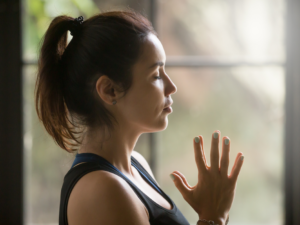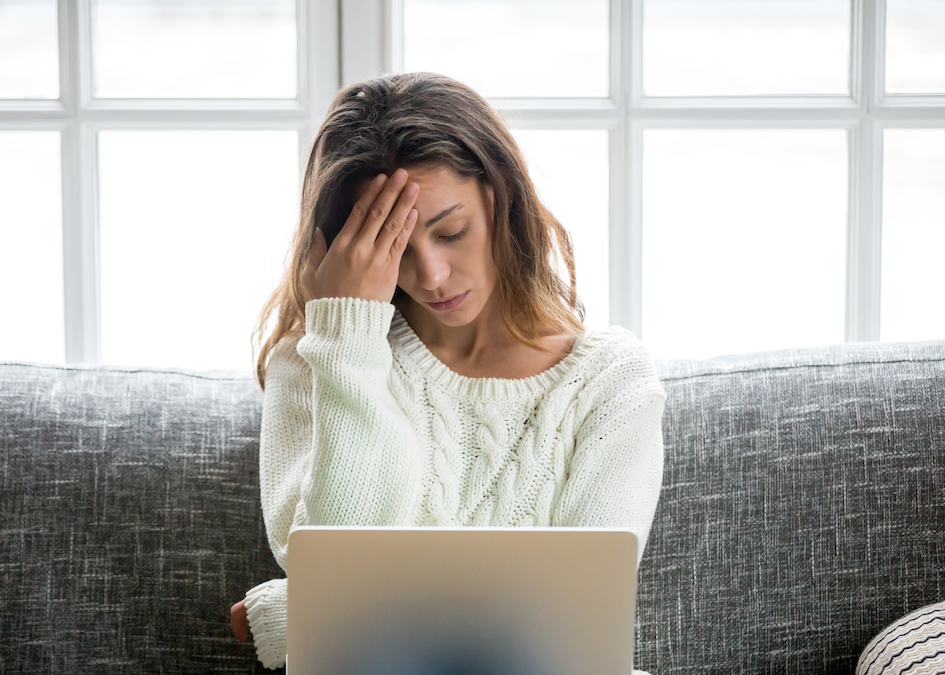4 Ways to Reduce Anxiety Now
Oh anxiety– a frequent (and unwelcome) companion for many. Those of you who experience anxiety routinely know how exhausting it can be. Although anxiety can be important and helpful, when it gets too high it often stops being helpful and instead can cause more harm.
A Family Story of Anxiety
A few weeks ago my sister called me in the middle of the work day. This timing is not part of our norm, and so I was immediately alarmed. I picked up the phone and asked what’s up? She dove right in. She told me about the intense pressure she’d been under at work, the amplification of that pressure over the last several days, and the hour-long count down to a dreaded interaction with an employee that she anticipated was not going to go well.
My sister, who tends not to ask for much, stated I need help. She went on to describe classic symptoms of anxiety:
- Rapid heartbeat
- Shortened breath (i.e. inadvertently holding her breath)
- Chest constriction
- Muscle tension
- Sweating
- Difficulty concentrating
There are many more symptoms of anxiety, but these were the ones she was experiencing that day. And she was looking for ways to reduce her anxiety so she could get through her day.
There are lots of things we can do to reduce anxiety preventatively, and this is ideal, but it’s not always possible. What follows are my suggestions for my sister to help her reduce her anxiety in the moment. I hope they help you too.
4 Tools To Reduce Anxiety Right Now
Breath Deeply to Reduce Anxiety
We all know this one, at least cognitively, and it’s easy to write it off. Yah, yah, yah, deep breathing, what else do ya got?! We breathe all day, every day, so it can be easy to question how focusing on this thing that we’ve already been doing all along is suddenly going to help. But deep breathing is a whole other ballgame.
When we are anxious, we tend to start constricting our breath. We might find ourselves inadvertently holding our breath, or taking frequent shallow breaths and forgetting to exhale. Try it right now, just to see what it feels like…. Take 5 short breaths in a row, focusing on quick and rapid breaths and brief exhale. What does it feel like for you?
Even if you’re not particularly anxious right now, the sheer acting of shallow breathing can lead you to feel anxious. What?!?! Just the way we breathe can create anxiety?! Yup, you’re reading that right.
Our breath has incredible power in shaping our experience, but we can use that to our advantage. So if shallow breathing creates anxiety, then deep breathing can create relaxation.

One of the simplest ways of focusing on breath that I’ve found is this:
- Breathe in for 6 counts
- Breathe out for 8 counts
- Repeat
That’s it! The key of getting your breath to help you relax is to focus on the exhales, and make them longer than your inhales. I suggest repeating this 10 times, then checking in to see if you need more.
Accelerate Your Heart Rate to Reduce Anxiety
It may seem counterintuitive to speed up your heart rate in order to feel relaxed. But it actually helps! When we engage in an aerobic activity (i.e. something that actually gets our heart pumping) the experience during the activity is of course strenuous. And this can actually work in our favor, by allowing us to expel all that pent up energy that is stored within our body and get it out. This might mean going for a run, doing a hiit workout, or just doing a bunch of exercises in your living room (think push ups, jumping jacks, mountain climbers, etc).
So this exertion of energy can help reduce anxiety, but what can be even more powerful is the experience after the workout. Naturally your body is going to start to cool down and slow down. Your heart rate will decrease, your breath will become more regular, your muscles will relax, and it’s all of this bodily information that sends a message of relaxation to your brain.
When we are anxious, our body often behaves like it’s doing a workout (rapid heart rate, shallow breathing, tensed muscles, etc). But because we’re not actually working out, it’s harder to get those systems in the body to calm down on their own. So if we push our body into an actual workout, we can then rely on the body’s normal mechanisms for cooling down to help generate the feeling of relaxation.
Relax Your Muscles to Reduce Anxiety
You might now see a pattern in the way our body and our mind impact one another. Our body can act in ways to create anxiety, and our anxiety can lead our body to respond in kind. But the opposite is also true. Our body can act in ways to create calm, and our calm mind can lead the body to respond with relaxation.
These first three strategies listed are all intervening through the body in order to create change in our emotional state. Progressive Muscle Relaxation is one more strategy to do so.
In this technique, we slowly move through different parts of our body, starting either at the head or the toes, and intentionally release any tension observed. For example, we might move from our head, to our forehead, to our eyes, to our jaw, to our neck, to our shoulders, to our arms, to our hands, and so on down the rest of our body.

We first intentionally tighten the target muscle for a few seconds and then release the tension in order to allow ourselves to experience the distinction. It can be nice to do this when you are alone and amidst quiet, although this isn’t necessary. You could do this technique standing over your kitchen sink, if that’s what the situation calls for. Once you start, just move all the way through your body in order to release any tension built up in different parts that you may not have been previously aware of.
Challenge Your Maladaptive Thoughts
This next technique intervenes at the mind side of things by focusing on our thoughts. Although we may not realize it, our thoughts often play a role in exacerbating our anxiety. This is because what we are saying to ourselves inside our head can often amplify our perception of the threat or predict worse outcomes than is realistic. Have you ever found yourself thinking things such as these…
- I’m never going to be able to do this
- I can’t handle this
- This is going to be terrible
- I’m going to hate this
- People are going to laugh at me
If you’ve found yourself saying things like this to yourself, then your thoughts are a huge contributing factor to your anxiety. Go back and re-read those statements I just listed. Who wouldn’t feel anxious if these statements were true?
The problem is, these thoughts are very likely exaggerations and misperceptions of reality, and their presence in your brain is just leading you to feel more anxious than necessary. When it comes to modifying thoughts, the two questions I recommend to lead the way are:
- Is this thought really true?
- Is this thought helpful?
We want our thoughts to be BOTH true and helpful. So while there may be times when we really are about to do something terrible (the thought is accurate), it’s likely not the most helpful way to think about it. Nudging our thoughts a little, so that they are both accurate AND helpful is going to help to reduce our anxiety. The revised thought might be something like This is going to be tough, but it’s going to be over soon. See how we are not changing the accuracy of the thought, but we are putting a more helpful spin at the end? That’s what we are going for here… just giving our mind something hopeful to hold onto.
I hope these 4 strategies help you to reduce your anxiety in those difficult moments so that you can get through them. Just remember, coping skills aren’t about making your feelings go away. Instead, they are about reducing the intensity so we can pay attention to the message our feelings are telling us and respond accordingly.
_____
Dana Basu, PsyD is a licensed clinical psychologist at EverGROW therapy and founder of Everything But Crazy, an online resource for parents. She provides individual therapy, support groups, and online resources for parents in Orange County and throughout the state of California via online therapy. She specializes in working with the highly sensitive person and people with difficult childhood experiences, trauma, parenting stress, and chronic guilt.

